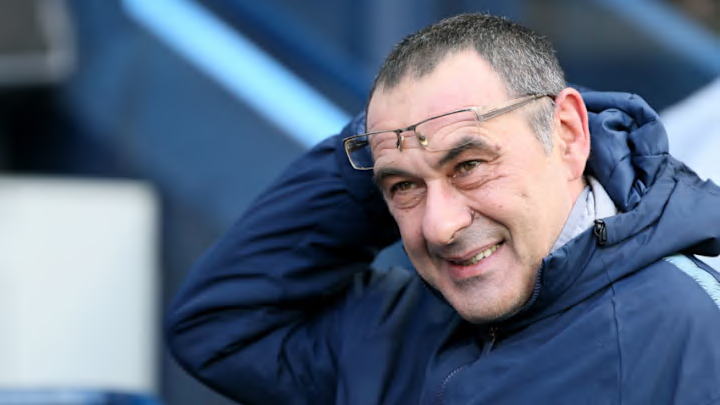Maurizio Sarri may not be Chelsea manager for much longer, but he hasn’t been given the players necessary to implement his style.
The impact was immediate. Appointed deep into the summer months, with Chelsea already in preseason training, many expected Maurizio Sarri to take a while to make his mark. Instead, the Stamford Bridge side put together a five-game winning streak to start the Premier League season, playing an exciting, dynamic brand of soccer dubbed Sarriball. In retrospect, though, it was the worst start possible.
It was a false dawn. It raised expectations to an unrealistic height. Now, with two thirds of the season played, Chelsea and Sarri are facing something of an existential crisis. Sarriball has become nothing more than an abstract vision of a future out of reach, with the former Napoli coach believed, by many, to be on the brink of losing his job, the job he has only had for a matter of months, as Blues boss.
Indeed, Chelsea’s season is in a state of disintegration. With every damaging defeat, another chunk of aspiration, of Sarri’s grand plan, falls away. Last week’s defeat, a 6-0 thumping at the hands of Manchester City, was the most damaging yet, not just knocking the Blues out of the top four, but exposing just how far off the top level Sarri’s team are.
How much of that is Sarri’s fault, though? The Italian was hired not just to put a winning team on the pitch, but to impose a new philosophy on the club and overhaul the entire culture around Stamford Bridge. Chelsea owner Roman Abramovich had long desired a modern, attractive team in the style of Pep Guardiola’s great Barcelona side — he even approached Guardiola before he went to Manchester City — and Sarri was billed as the man to deliver on that vision.
At Napoli, Sarri marked himself out as one of the pre-eminent coaches of his generation, not by winning trophies (he has yet to win a major title has a manager), but by implementing a style of play that caught the eye of many around Europe. Napoli were, indeed, a must-watch last season and they pushed Juventus all the way at top of Serie A.
Things have been rather different for him at Chelsea. Denied the profile of player needed to replicate his Napoli success, Sarri has only been able to impose a limited imitation of his philosophy. For English fans, the term Sarriball has become a phrase of derision, such has been the insipidness of some of Chelsea’s performances of late, but that’s because Sarri doesn’t have the tools to show them what his trademark ideology is truly about.
He’s fighting against the tide of years and years of shoddy transfer market investment by Chelsea. Pumped up with Abramovich’s oil billions, the Stamford Bridge outfit could once pay for the best. Eden Hazard, for instance, was lured to the King’s Road when Manchester United were also interested. Didier Drogba could have gone to Real Madrid, but instead signed for Chelsea.
It’s been a different story in recent years, though. Whether priced out of the market due to factors outside their control or restricted by Abramovich tightening the purse strings, Chelsea’s quality has been diluted. When they sold Diego Costa, Alvaro Morata was signed as a replacement. When Thibaut Courtois was sold, Kepa Arrizabalaga arrived in his place. The trend will continue if Christian Pulisic has been signed with a view to becoming Hazard’s successor this summer.
Of course, Sarri isn’t the first figure to sit in the Stamford Bridge dugout to find this out. Ultimately, it’s what finished his predecessor, Antonio Conte, with the Italian departing the club in frustration over transfers, or a lack thereof, at the end of last season.
On more than occasion, Chelsea have shown some sort of desire to evolve the club. Luis Felipe Scolari, Andre Villas-Boas and Sarri have all, at one point or another, all been hired to impose a new style of play on a club renowned for their sporting conservatism. But in each and every case, that intention hasn’t been followed by commitment at boardroom level. History may well be repeating itself.
